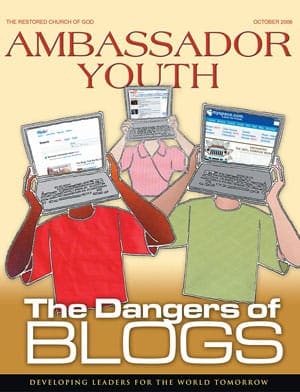You have been blessed with an unparalleled communications tool that allows you to communicate with your peers from across the street, the country or even the other side of the planet!
Like any form of technology, instant messaging (IM) can have good and bad uses. With the right parameters it can be a tool to develop friendships among God’s people from every corner of the earth. However, the anonymity that this medium provides can lead to standards that slip.
There are several aspects of instant messaging that should be addressed:
• Subjects: As with any conversation, instant messaging can flow in many directions. This is particularly true if there is a larger group of users messaging each other. Do not let the standards you apply in face-to-face conversations slip online. Remember, you represent God’s Way; your conversations should be deeper and your standards higher than your peers in the world.
Take extra care if messaging or “chatting” on the Sabbath. It should be done in moderation, as this is a time to draw close to God. Do not drift into worldly topics. Be aware of a conversation’s direction, and steer it back into Sabbath-appropriate subjects if necessary. You could discuss last week’s sermon, upcoming Holy Days, changes in world events, announcements about growth in the Church, etc. Challenge yourself! During the week, be mindful of things you may want to discuss with your friends (online or at services). Then when the Sabbath arrives you will have a long list of items to discuss. A great underlying principle of appropriate IM subjects is this: “Would I feel comfortable discussing this subject with my parents? What about with God?”
By focusing on godly subjects, you not only obey God’s command to keep the Sabbath holy, the conversations will be deeper and will enrich all involved.
• Spelling and Grammar: It has become common to allow sloppy, improper spelling and grammar to creep into online communication. Spawned by text messaging on cellphones, “text speak” can appear in instant messaging. Text speak is a kind of new language—one that you should avoid! The more you use it, the more it will become second nature. By typing full sentences that are grammatically correct, you are training yourself to be a more effective writer and communicator. Writing will become natural to you. This improves other areas of life—especially when writing essays in school. Apply this principle to emails to further accelerate your writing and spelling ability.
• Involving New People: As The Restored Church of God grows faster and larger each year, many new young people are coming with us, each with different backgrounds and experience. Some may have come from a splinter; others from the world. Some may have come with their parents; others on their own.
There may be instances when you invite new teens into group messaging. (As a side note, group messaging should be approached very carefully due to the greater potential of inappropriate conversation.) Keep in mind that their backgrounds and experience with God’s truth may be different from your own. They may be nervous or unsure how other teens will receive them. Your job, as a light to the world and to those coming into the Church, is to show brotherly love and the right example.
Involving people during Sabbath conversations also means being wise about who you invite. Just as you would not call worldly friends during the Sabbath, you would not have long conversations with them online either. There is no way they could understand why you keep the Sabbath and why you strive for conduct and conversation appropriate to this day.
There are also those who, for a variety of wrong reasons, choose to leave God’s Church. You do not see your friends each week at Sabbath services, and may not be aware they have left. Be wary when people begin to say things contrary to what the Bible teaches. There are clear biblical commands on how one must avoid those who speak against the Bible, Church or ministry. Such instances should always be reported to your parents or the ministry.
• Displaying Names and Messages: IM programs allow for some freedom of expression, allowing you to select the name that is to be displayed and the picture that goes into your profile. But be sure to use wisdom and select appropriate pictures. The less information you keep in your profile, the less other people can see. Also ask yourself: “Am I selecting a photograph that reflects me being a light to the world?”
The same can be said about screen names. Names that are displayed should be your name. Screen names represent the person typing the message and should not be some saying, message, joke, website, etc. Also you should never pretend to be someone else. Just as you would not sign a letter with symbols, jokes, etc., because it looks childish, you should not do so online. (In addition, be aware of what your “away message” says.)
• Privacy: Online privacy is extremely important—and in some cases, it is a matter of safety. Never give out other people’s screen names or email addresses, unless you have been given permission. This would be akin to giving a phone number or address without permission. (This includes mass email forwards, which should also be avoided.) In this light, remember that your email address (or screen name) is your online phone number. You should be careful about who receives it, and never post it publicly.
• Instant Messenger Dating?: You may not have considered it, but many of the rules discussed in the book Dating and Courtship – God’s Way apply to instant messaging. Remember, the only real difference between a face-to-face group date and group instant messaging is the technology. If we view it from that framework, the dynamics of group and one-on-one messaging become easier to understand.
When you are chatting in a group, all the rules of group dating apply. Therefore, parents should know about and periodically monitor the conversations. This is VERY important. (Of course, teenagers need not worry about this if conversations are proper.)
Two teens of opposite gender must exercise extreme caution when IM-ing each other. While occasional chatting is permissible, it is very easy for such to lead into dating-type conversations. Again, you are urged to read or reread Dating and Courtship – God’s Way to expand on these points.
• Text Messaging: The rules and principles covered above equally apply to text messages. The main difference is texting can be done anywhere—and at anytime. Proper etiquette of when it is appropriate to text message parallels that of when it is appropriate to take a phone call. One should never take a phone call or text message during class, sitting for a meal or during social functions. It shows a disinterest, and is both disrespectful and rude. (Of course, cellphones should never be taken into Sabbath services.)
Instant Messaging with others from around the world can be a wonderful way to develop friendships, learn about other cultures and much more!
Inspired by God, Solomon summarized the entire principle of communication. While we can apply it to every aspect of our lives, it has much more direct application to instant messaging: “Be not rash with your mouth, and let not your heart be hasty to utter any thing before God: for God is in heaven, and you upon earth: therefore let your words be few” (Ecc. 5:2). In essence, we are commanded by God to think through what we say. Determine never to allow idle words to dominate your conversations.
Overall, it is important to apply wisdom to all communication. Prayerfully ask God for guidance. We should make our words count (Prov. 25:11).
If you apply these principles, you can harness the power of this communication medium and develop bonds and friendships that will last for eternity!



















